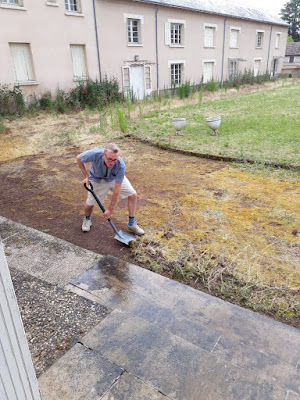Saturday, 30 January 2021
St Blaise and the Blessing of throats
Saturday, 23 January 2021
Third Sunday of the Year
Tuesday, 19 January 2021
Spiritus Domini
I've just read an excellent article posted on the New Liturgical Movement. It helps to put into a wider context the universal call of the laity, the scope of which was actually re-iterated and and then much ignored by the Second Vatican Council.
It has long been a mystery to me that before the Council lay-led groups whose focus of activity was out in the world seemed to thrive in abundance: Young Christian Workers, Legion of Mary, SVP, Knights of St Columba, etc.
While since the Vatican Council these groups have been seen as old-fashioned and very ecclesiastically centered ministries have taken over, where the laity seem to take on roles on the sanctuary rather than ministries that focus out into the world.
I'm not suggesting there is no charitable work going on in parishes but the ecclesial sanctioned groups ("ministries") seem to be overwhelmingly about getting lay people up on the sanctuary instead of motivating action on the secular stage, the one place where they have much more influence and contact than the priest.
Well worth a read...
New Liturgical Movement: Lay Ministries Obscure Both the Laity’s Calling and the Clergy’s
Saturday, 16 January 2021
Masses Second Sunday of the Year
Just to confirm that St Catherine's remains open for Mass. Many people are still shielding, either for their own protection or those they are caring for. We unite ourselves in prayer with all the parish at each Mass. Even if you cannot attend the Holy Sacrifice in person, to know that the Sacramental Presence of the Lord descends in God's House here in our locality is a blessing in itself. The beating heart of our community, whether we are present or not. I'm sure we all long for the time when everyone can once again be physically close to that heart - together with our brothers and sisters at Mass. It's a reflection that in more ordinary times, every Catholic missing from Sunday Mass is a loss to their brothers and sisters gathered in the Presence of the Lord.
This week sees the feast of St Sebastian (on Wednesday), traditionally a great intercessor for times of plague.
A Prayer to Combat the Coronavirus Pandemic:
Most Merciful and Triune God, We come to You in our weakness. We come to You in our fear. We come to You with trust. For You alone are our hope. We place before You the disease present in our world. We turn to You in our time of need. Bring wisdom to doctors. Give understanding to scientists. Endow caregivers with compassion and generosity. Bring healing to those who are ill.
Protect those who are most at risk. Give comfort to those who have lost a loved one. Welcome those who have died into Your Eternal Home. Stabilize our communities. Unite us in our compassion. Remove all fear from our hearts. Fill us with confidence in Your care.
Hear us, O God, our Saviour, and by the prayers of glorious Mary, Mother of God, and ever-Virgin, of St. Sebastian, your martyr, and of all the saints, deliver your people from the present affliction, and in your bounty let them feel certain of your mercy. Amen.
Lord, mercifully heed our supplications, and heal our infirmities of body and soul; so that knowing your forgiveness we may ever rejoice in your blessing.
8.30am
10am
Monday 9.30am
Tuesday 12 noon (EF)
Wednesday 9.30am
Thursday 7pm Novena & Benediction
Friday 9.30am
Saturday 12 noon (EF)
Confessions between 11.30am & 11.50am
Catholic School -- how to make one!
Saturday, 9 January 2021
Masses this Sunday
Tuesday, 5 January 2021
Masses continue during new lockdown
For anyone wondering, here in England, Masses will continue during this new lockdown. The government's rules dealing with Places of Worship (ie Churches) says:
Communal worship and life events - You can leave home to attend or visit a place of worship for communal worship, a funeral or event related to a death, a burial ground or a remembrance garden, or to attend a wedding ceremony. You should follow the guidance on the safe use of places of worship and must not mingle with anyone outside of your household or support bubble "
Mass for the Epiphany tomorrow is at 9.30am.




































